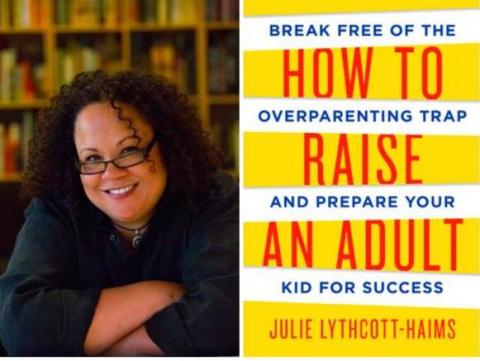"How to Raise an Adult" - is the best parenting book
Parenting is tough, don’t get me wrong, but Lythcott-Haims sets out to show that parenting doesn’t need to be as all-consuming and exhausting as it is for many American families these days, nor should it be. The basic premise of “How to Raise an Adult” is that kids are overparented these days to the point of damaging them. After ten years of working as an undergraduate counselor at Stanford, Lythcott-Haims came to believe that there is something wrong with Millennials – and it’s not their fault; rather, it’s their parents, who, with all the best intentions, have become completely over-involved in their kids’ lives. The students coming into Stanford seemed “somehow not quite formed fully as humans. They seemed to be scanning the sidelines for Mom and Dad. Under-constructed. Existentially impotent.” She goes on to describe them, quite sadly, as “veal,” raised in a tightly controlled environment before being led to slaughter in the real world.
Lythcott-Haims builds a strong argument right from the beginning, backed by years of personal experience, many first-hand interviews with counselors, parents, young adults, psychologists, and professors, and a lengthy bibliography that shows she’s really done her research. The stories she tells of Millennial-aged young adults, helpless in the face of real life, are sad and disturbing. These young people, who should be embarking on an exciting new stage in life, are unnaturally dependent, unmotivated, scared, and unable even to perform such basic tasks as getting themselves from point A to point B, speaking with professors, and furnishing an apartment without parental assistance.
A big part of the parenting problem, she explains, is the American obsession with getting one’s kids into a top-tier college. There is a skewed belief that everything a child does will eventually go onto a college application, which makes parents highly anxious about making that list as impressive as possible. This comes at a steep cost. Families’ lives are scheduled to the point of insanity; children are losing out on a ‘normal’ childhood that includes downtime and free play; parents, particularly mothers, are sacrificing their own interests for the sake of their children’s extra-curricular activities and are self-medicating to handle their own depression; and vast sums of money are being spent on special tutors, college ‘handlers’, sports and other activities, all in hopes of forming the perfect, ideal college applicant in the eyes of a few Ivy League schools that will only accept 5 to 10 percent of applicants.
“[The students seemed] somehow not quite formed fully as humans. They seemed to be scanning the sidelines for Mom and Dad. Under-constructed. Existentially impotent.”
To make matters worse, overparenting is messing with kids’ development. They’re failing to learn basic life skills, not even considering themselves to be adults. It’s affecting their mental health, diminishing their ability to cope with failure and criticism. It’s making them depressed and addicted to harmful substances as a means to regain control of their lives, even to help them study.
Lythcott-Haims dedicates the final 150 pages of the book to “the case for another way,” offering tangible advice for how to implement parenting practices that will grow responsible, mature young adults. Her ideal is an ‘authoritative’ parenting style, one that “balances warmth with strictness, direction with freedom," and seeks to put opportunities for independence into our children's lives. She insists on the importance of unstructured play time, teaching life skills through chores, teaching children how to think using conversation models and proper questioning, preparing them for hard work by setting high expectations for their help at home, and normalizing the idea of struggle, which is something so many parents try to erase on behalf of their children.
The book resonated deeply with me, as Lythcott-Haims echoed many of the thoughts I have on parenting. It was also deeply satisfying to know that someone else out there thinks the same way I do, and that I’m not the only parent refusing to sign my kids up for soccer and hockey because I don’t want those commitments to fill our family life with yet more chaos.
The book has challenged me to examine the many things I do around the house that could (and should) be done by my kids, instead. As a result, they’ve received revised chore lists for this school year that are much longer than anything they had before. So far, they’ve proven to be perfectly capable.
You can order “How to Raise an Adult” online. Learn more here.
Katherine Martinko

